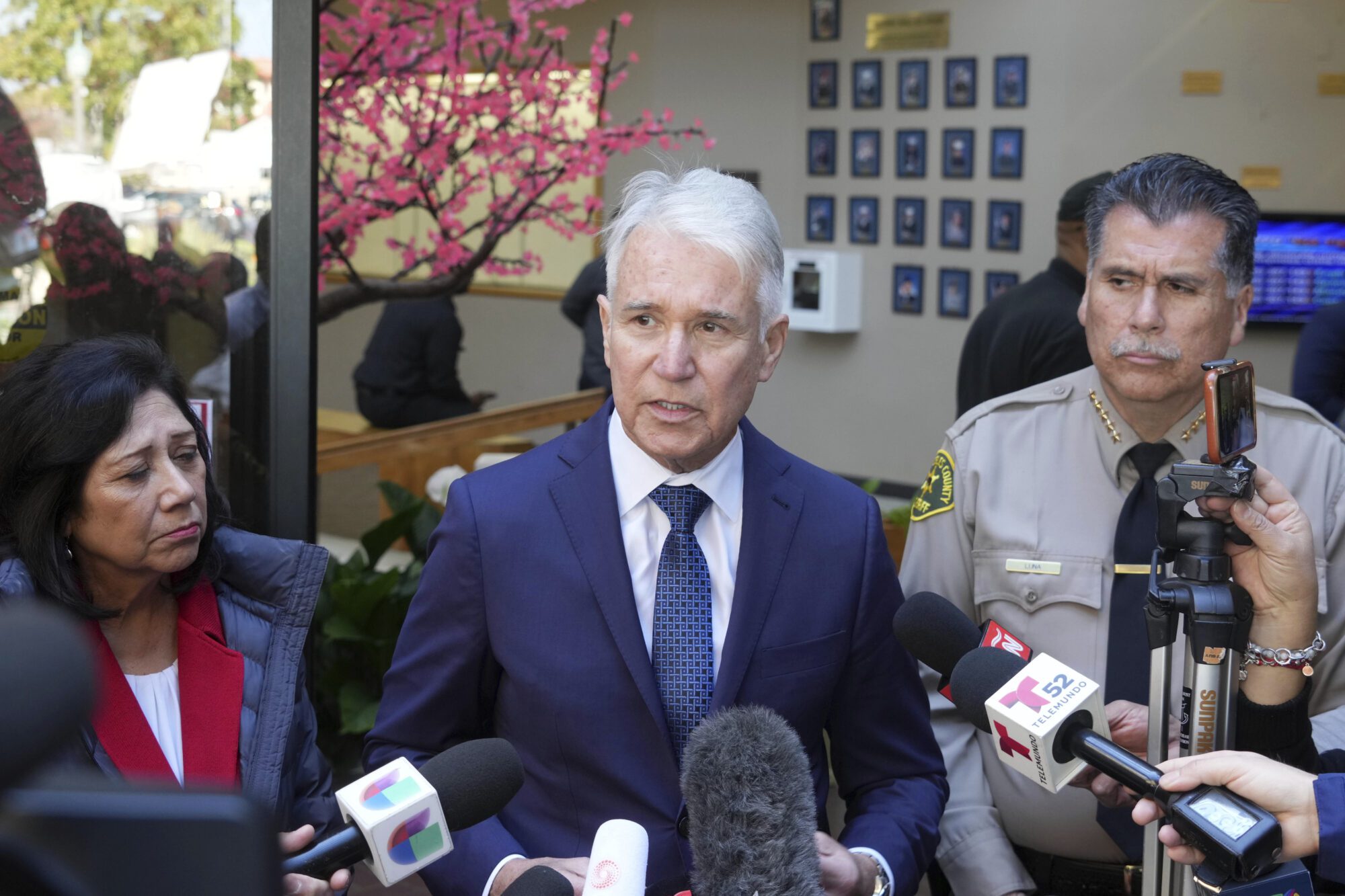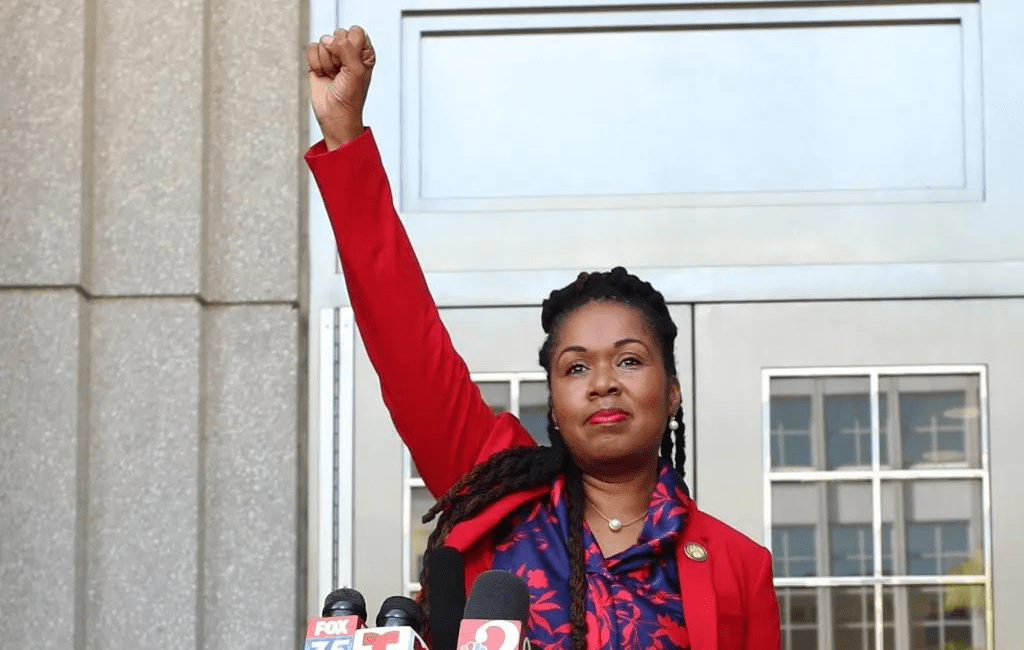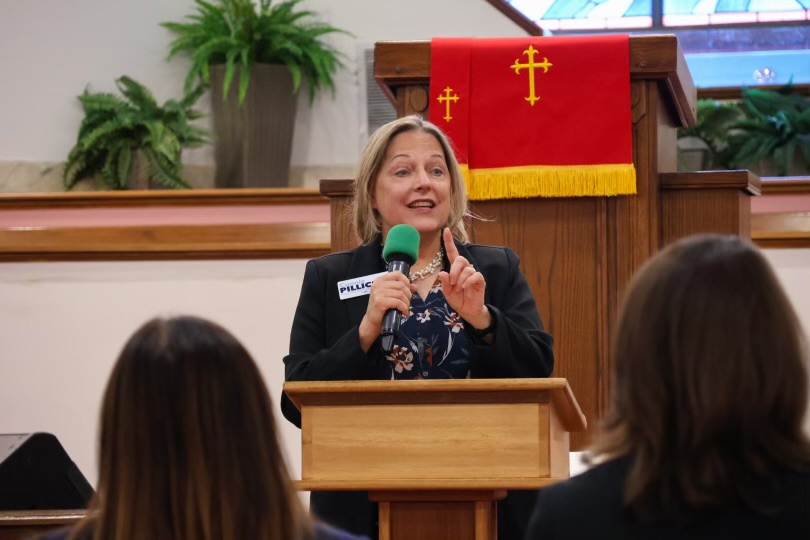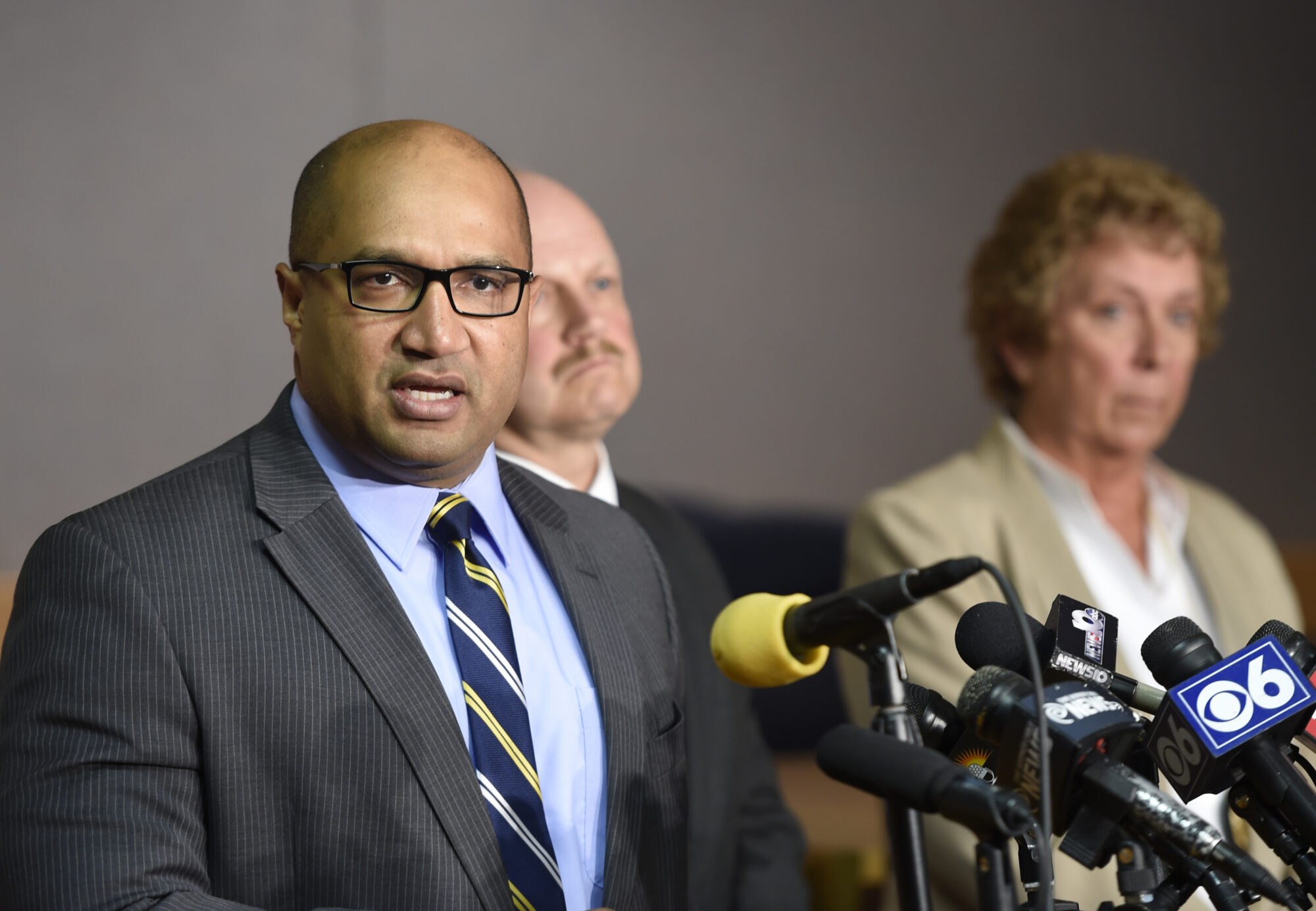The 33 Prosecutor and Sheriff Elections that Matter to Criminal Justice in November
These offices have wide powers over the scope of incarceration and the conditions of detention, issues that are on the ballot from Tampa and Savannah to Phoenix.
| October 18, 2024

Whoever wins the presidency on Nov. 5, a large share of the decisions on crime, policing, and immigration enforcement will come down to the prosecutors and sheriffs elected on that same day—officials with wide discretion over the scope and scale of incarceration, from who should be charged to conditions and treatment inside local jails.
While there are roughly 2,200 prosecutors and sheriffs on the ballot this year, there’s not much at stake in this election for most of these offices because they drew just one single candidate. But Bolts has kept track of other important races for sheriff and DA all year to identify and cover the elections that are poised to make the biggest difference for local policy. During the primaries, we covered critical DA races from Ohio to Texas and sheriff races from Florida to Michigan.
And now the general elections are upon us. Below is Bolts’ guide to 33 prosecutor and sheriff elections next month—and some honorary mentions, too.
Arizona | Maricopa County (Phoenix) sheriff
This used to be the office of Joe Arpaio, the far-right strongman who housed detainees at an outdoor camp called Tent City and was convicted of contempt of court for refusing a court order to stop detaining people suspected of being undocumented, only to be pardoned by Donald Trump. Paul Penzone, the Democrat who defeated Arpaio in 2016, resigned from the office earlier this year, and Jerry Sheridan, a former Arpaio deputy, is now trying to win back the office for the GOP.
Sheridan is on the Brady List, a database of law enforcement officers with a history of lying, because a judge found that he lied under oath during a civil rights lawsuit. Sheridan has said he’d bring back some of the most controversial practices from his former boss, Arpaio, including building a new facility like Tent City, which the county tore down in 2017. Tyler Kamp, a former Phoenix police officer who switched parties late last year to run for sheriff as a Democrat, is connecting Sheridan to Arpaio’s record of racial discrimination.
Arizona | Maricopa County (Phoenix) prosecutor
Just two years ago, Republican County Attorney Rachel Mitchell narrowly defeated a progressive challenger who ran on curbing the punitive legacy of this office. That was a special election, so Mitchell is already back on the ballot, and this time her challenger has a different message. Tamika Wooten, who ran unopposed for the Democratic nomination, has accused Mitchell of “leniency” toward defendants and faulted her use of diversion programs, The Arizona Republic reports. Wooten’s criticism echoes the attacks made by Mitchell’s primary opponent, who lost by a large margin in August.
On abortion, though, the fault lines in this race align more closely with partisan expectations. When the state supreme court revived an 19 century ban on nearly all abortions this spring, Wooten told Bolts that she would not bring charges under the law, saying, “That is a very serious and personal decision that a person must have with themselves and with their health care provider.” While lawmakers later overturned the 1864 law outlawing virtually all abortion, a ban after 15 weeks remains in place, and Mitchell has refused to rule out prosecuting doctors. She has also fought an effort by the Democratic governor to prevent local prosecutors from charging abortions.
Arizona | Pima County (Tucson) sheriff
This race erupted in controversy this week after Democratic Sheriff Chris Nanos put challenger Heather Lappin, a Republican who works in the local jail, on forced leave. Nanos alleged that Lappin helped the newsroom Arizona Luminaria, which has long reported on excessive force and inhumane conditions in the Tucson jail, connect with an incarcerated source for pay. Arizona Luminaria has denied that it pays sources, saying it only reimbursed an incarcerated source for costly phone calls from the jail.
Nanos’ leadership over the jail, which has seen a string of deaths during his tenure, has been subject to scrutiny. Moreover, the county board, which is run by Democrats, has for months pressed Nanos for information about sexual assault allegations against a sheriff’s deputy. Nanos and Lappin have largely blamed problems at the office on understaffing, Arizona Luminaria reports.
The race is unfolding against the backdrop of a GOP ballot measure, on the ballot this fall, that would ramp up the role of sheriffs in patrolling the border. Nanos has steadfastly opposed the measure, and he has said he would not enforce it. He defeated a challenger in the July Democratic primary who argued for tighter relationships with federal immigration authorities. Lappin said during the GOP primary that she supported the measure but has since backtracked.
California | Alameda County (Oakland), and Los Angeles County
Two first-term DAs in California faced near immediate efforts to remove them from office, plus mutinies by staff within their office angered by their reforms. Now each faces a political threat. In Oakland, former civil rights attorney Pam Price won the DA’s office in 2022 on a decarceral platform, and rolled out policies meant to focus on rehabilitation over punishment. But local forces who opposed her election, many of which had just succeeded in ousting San Francisco’s DA next door, quickly organized a recall campaign against her, Bolts reported in August.

Further south, in Los Angeles, George Gascón made a splash within a day of entering office four years ago, as he rolled out a suite of policies to reduce cash bail and sentencing enhancements. Much like Price, Gascón faced a deluge of controversy and negative press over specific cases that critics said he did not prosecute aggressively enough, and he backtracked on some of his measures, Bolts reported earlier this year.
Now Gascón faces Nathan Hochman, who is running on bringing back more punitive policies to the office and accuses the incumbent of having “extreme pro-criminal policies,” even as violent crime in Los Angeles is decreasing. Hochman was the GOP nominee for attorney general two years ago, though he is helped in this blue county by the fact that this race is nonpartisan.
California | San Francisco prosecutor
Brooke Jenkins replaced the reform-minded Chesa Boudin as prosecutor in 2022, after Boudin was recalled by voters. As Bolts reported at the time, Jenkins quickly disbanded one of Boudin’s major initiatives, a police accountability unit that had prosecuted killer cops. Jenkins won when she faced voters for the first time two years ago, and is now running for a full term.
She faces Ryan Khojasteh, a former prosecutor in the office who was hired by Boudin and then promptly fired by Jenkins when she took office. Khojasteh is making the case that Jenkins has gone too far in ramping up punishment for teenagers accused of crimes, proposing a return to more rehabilitative policies. He has criticized her for rolling back diversion programs But he has also tried to distance himself from Boudin and eschew some of his policies. This election is overshadowed by the higher-profile races for mayor and city council, which feature similar debates, and even candidates who are proposing to ramp up policing and arrests on matters like homelessness.
Colorado | Arapahoe County prosecutor, and Douglas County prosecutor
Arapahoe and Douglas, two populous counties south of Denver, have long shared a DA. But as Alex Burness writes in Bolts, come 2025, “similar criminal cases may be met with starkly different responses—depending on which side of [a] new administrative boundary they occur.”
That’s because Colorado recently split its 18th Judicial District in two, separating the liberal Arapahoe County (home to Aurora) from its more conservative neighbor.
As a result, a reform-minded prosecutor may be coming to suburban Colorado. Democrat Amy Padden is favored over former Republican DA Carol Chambers in Arapahoe County. Padden lost her first DA bid in 2020, when she said she’d work to curb jail terms for low-level offenses and reduce the prosecution of minors as adults. She has kept up these themes this year. “We’re not going to prosecute our way to a safer community,” she told Bolts in July. “The way we reduce crime is to see if there are ways to rehabilitate folks and get them back on their feet.”
Douglas County is likely to head in the opposite direction. The GOP tends to do very well here, so Republican George Brauchler, a former DA with a punitive record, is favored over Democrat Karen Breslin. Brauchler is running on the unusually harsh promise of seeking jail time for anyone who commits any theft, Bolts reported in July.
Florida | Hillsborough County prosecutor, and prosecutor for Orange and Osceola counties
Twice since 2022, GOP Governor Ron DeSantis has removed a reform-minded prosecutor from office. The legal battles over whether he had the authority to do this are still ongoing. But the two suspended prosecutors are not waiting for the courts: They’re running to get their jobs back, challenging the people DeSantis appointed to replace them.
In Hillsborough County, home to Tampa, Democrat Andrew Warren faces Republican Suzy Lopez, the DeSantis appointee. Lopez quickly rolled back Warren’s policies, Boltshas reported, canceling a reform he had put in place to curb aggressive policing of Black cyclists in Tampa. In the Orlando metro region, in a circuit that combines Orange and Osceola counties, Democrat Monique Worrell faces DeSantis appointee Andrew Bain, who is running as an independent. This race is marred by a legal complaint that the GOP fielded a sham candidate to help Bain.

Complicating both elections, DeSantis may choose to overturn the elections again if Warren and Worrell win, maintaining Lopez and Bain in office no matter the results. He kept that door open in remarks in September, and some Republicans have said they expect it should voters reject his appointees.
Georgia | Chatham County sheriff
The Savannah jail, long plagued by allegations of neglect and abuse, has become a flashpoint in the race between Republican Sheriff John Wilcher and Democrat Richard Coleman, a local police chief.
Wilcher’s campaign has received thousands of dollars from jail contractors, including people associated with CorrectHealth, the jail medical provider targeted by a scathing 2019 investigation into treatment at the jail and at the center of a wrongful death lawsuit alleging poor treatment. Wilcher has also stopped in-person visitations, which Coleman says he will restart if elected; such visits can be an important lifeline for people who are detained.
Many other Georgia sheriffs oversee jails with abusive conditions, though they may not be holding competitive races this fall. Clayton County Sheriff Levon Allen, a Democrat who oversees a jail where deaths keep mounting, is unopposed, for instance.
Georgia | Cobb County sheriff, and Gwinnett County sheriff
When Democrats in 2020 flipped the sheriff’s offices in Cobb and Gwinnett, two large counties in the Atlanta suburbs, it prompted rapid change in immigration policy: The new sheriffs immediately fulfilled a campaign promise to cancel their counties’ participation in ICE’s 287(g) program, which deputizes local sheriff’s officers to act as federal immigration agents.
But Georgia Republicans this year retaliated with a new law that requires sheriffs to apply to join 287(g), and hold people suspected of being undocumented when ICE requests it.
The law shrinks sheriffs’ discretion. But Priyanka Bhatt, an attorney with Project South, an organization that advocates for immigrants’ rights in Georgia, says sheriffs still have room to minimize ICE’s footprint, if they so choose. Even if a sheriff’s office is forced to enter into a 287(g) contract, she told Bolts, it can still refrain from proactively interrogating or arresting immigrants. “The way in which the sheriffs implement 287(g) is under their control,” she said.
The first-term Democratic sheriffs are now running for re-election. Cobb County Sheriff Craig Owens, who has spoken out against the new law and said he wouldn’t devote resources to 287(g), faces Republican David Cavender, who says he’d partner with ICE more closely and has echoed Trump’s rhetoric about the “open southern border.” Gwinnett County Sheriff Keybo Taylor faces Republican Mike Baker, who has made fewer public statements and who did not respond to Bolts’ request for comment on his views on immigration.
Georgia | Chatham County prosecutor, and Clarke and Oconee counties prosecutor
The Georgia GOP adopted a law last year that threatens to remove DAs from office if they adopt a policy to not charge certain types of cases, such as abortion or marijuana. Critics denounced the law as an effort to target a swath of new Democratic officials, mainly women of color. To sign the law, Governor Brian Kemp traveled to Savannah, home of DA Shalena Cook Jones, who ran on expanding diversion programs locally and has defended reforms from Kemp’s attacks.

Republicans also signaled that they hoped to use the law to target Deborah Gonzalez, the DA of Clarke County (Athens) and Oconee County, who’d quickly rolled out some reforms such as ending marijuana prosecutions after winning office.
The new law hasn’t yet been used to remove a DA. But Cook Jones and Gonzalez are now running for second terms, fighting off complaints that they’ve neglected the duties of their office, and saying they would continue their approach. Cook Jones faces Republican Andre Pretorius, with whom she is trading accusations of misconduct. And Gonzalez is facing Kalki Yalamanchili, a former prosecutor who is running as an independent.
Illinois | DeKalb County prosecutor, and Lake County prosecutor
In eliminating the use of cash bail last year, the Illinois Pretrial Fairness Act also made prosecutors the gatekeepers of bail reform, Bolts explained this spring. Proponents say they now hope that prosecutors will implement the law in good faith, though some prosecutors have been clear that they’ll do what they can to maximize pretrial detention.
The debate is playing out in two prosecutor races this fall. In Lake County, a populous suburb just north of Chicago, State’s Attorney Eric Rineheart was one of very few prosecutors who backed ending cash bail. Four years after ousting a GOP incumbent, he faces Republican Mary Cole, who has centered her campaign around her opposition to the Pretrial Fairness Act, saying it endangers public safety. (Data shows that crime has not increased since its implementation.)
West of Chicago, in DeKalb County, GOP State’s Attorney Rick Amato is retiring this year after spending the last few years fighting bail reform. Republican Riley Oncken is continuing Amato’s strategy of blaming Democrats for crime, while Democrat Chuck Rose says the law is working.
Kansas | Johnson County prosecutor, and Johnson County sheriff
Kansas’ most populous county voted for a Democratic presidential candidate in 2020 for the first time since 1916. Sheriff Calvin Hayden, a Republican, did not take it well, and spent the following years amplifying lies about the 2020 results and investigating unfounded allegations of fraud. GOP voters responded by kicking him out in their August primary, which he lost to Doug Bedford, a former undersheriff.
Bedford is now running against Democrat Byron Roberson, the Prairie Village police chief. In 2010, Roberson shot and killed a woman with a history of mental illness, Susan Stuckey, in her apartment. The local DA’s office declined to prosecute, but the family demanded answers and had to sue to obtain records that raised questions about the police response. As he runs for sheriff, Roberson has said the events made him more aware of a need for mental health professionals to respond to 911 calls.
The DA who decided to not prosecute Roberson at the time, Republican Steve Howe, is still in office and he has faced more recent accusations of glossing over police shootings; one investigation showed that he provided a false account of a 2018 shooting. This fall, Howe is seeking a new term against Democrat Vanessa Riebli, a former prosecutor in his office.
Riebli narrowly won the Democratic primary over a defense attorney who campaigned on a more progressive platform, while she focused on administrative restructuring like changing how cases are assigned in the office. She is also running on a promise to guard reproductive rights. One question is whether Hayden’s actions stain Howe: The DA has faced criticism within his own party for not speaking up against the sheriff’s endless and baseless investigation into local elections.
Michigan | Macomb County prosecutor
Peter Lucido faced multiple allegations of sexual harassment while he served in the Michigan legislature. After he became Macomb County’s prosecuting attorney in 2021, an investigation found that he had behaved inappropriately toward women working in his new office.
Lucido, a Republican, now faces Democrat Christina Hines, who has worked as a prosecutor in neighboring counties. In 2021, shortly after Eli Savit became the reform-minded prosecutor of Washtenaw County (Ann Arbor), Hines joined Savit’s office and helped develop a restorative justice program. Last year, she published an article that defended restorative justice as a rehabilitative tool that also brings more closure for victims. But as she runs in Macomb County, which Trump narrowly carried twice, Hines has distanced herself from some of Savit’s major policies, such as his decision to stop seeking cash bail, Michigan Advance reports.

Even so, CPAC, a prominent conservative conference that Lucido has attended, attacked Hines this summer with a social media ad associating Hines with George Soros, the billionaire whose super PAC has helped liberal prosecutors win office, calling her part of a “radical plan to fundamentally change Michigan, and ultimately our country.” Hines has denied any direct association with Soros, focusing her campaign on Lucido’s ethical issues, from the many allegations against him to his decision to celebrate Confederate General Robert E. Lee.
Michigan | Oakland County prosecutor, and Ingham County prosecutor
Two counties east of Detroit feature Democratic prosecutors running for second terms.
The race in Oakland County will be this year’s clearest test for criminal justice reform in Michigan. Karen McDonald, a self-described “progressive prosecutor,” has expanded diversion programs, and she has helped some people who were sentenced to life without parole as children apply for resentencing. Her Republican challenger, Scott Farida, is a former prosecutor who says the office should be harsher toward defendants.
In Ingham County (Lansing), Democrat John Dewane was appointed prosecutor in late 2022 after his predecessor Carol Siemon resigned. Siemon had implemented reforms to reduce incarceration, including limiting firearm possession charges and refusing to seek life without parole for people accused of murder. Dewane rolled back her reforms when he took office.
The county is blue enough that Dewane is the clear favorite to win a full term next month. But the race is still worth watching because of who the GOP nominee is: Norm Shinkle played a starring role in one of the moments where Trump came closest to overturning the 2020 election results. As one of the four members of the State Board of Canvassers that fall, Shinkle refused to certify the results, amplifying Trump’s false claims of widespread fraud. Michigan is intimately familiar with what a law enforcement official willing to entertain election conspiracies can bring: Just an hour west of Lansing, a sheriff has kept investigating the 2020 election.
New York | Albany County prosecutor
David Soares, a vocal foe of criminal justice reform and the DA of New York’s capital county for two decades, lost in the June Democratic primary to local attorney Lee Kindlon. But he did not concede and he is now mounting a write-in campaign to secure a sixth term.
Bolts reported this summer that Soares has used his bully pulpit to attack a suite of reforms passed by Democrats, most notably the landmark changes to New York’s bail system and a law that raised the age for charging people as adults from 16 to 18. Kindlon is more supportive of the reforms, and he has accused Soares of fearmongering. Albany progressives who back Kindlon say they hope that the election fosters more attention to rehabilitation and diversion efforts, especially for young people.
Ohio | Hamilton County (Cincinnati) prosecutor
Four years ago, Republican Joe Deters held on to this prosecutor’s office after beating Fanon Rucker, a Black Democrat who told Bolts this year that racist messaging against him contributed to his loss. But Deters joined the state supreme court last year, and was replaced as prosecutor by Republican Melissa Powers, who has emulated his rhetoric. She has said that, if she loses, Cincinnati will transform into “a Baltimore, a Saint Louis,” she has called for maximizing prison terms, and she has joined the police union in attacking local judges as “woke”, particularly juvenile court judges that she claims are too lenient. The Cincinnati Enquirer reported that a decrease in youth crime belies the fearmongering against judges.

Powers faces Democratic challenger Connie Pillich, a former lawmaker and an unsuccessful candidate for governor. Pillich’s campaign has not focused on proposing criminal justice reforms; as a lawmaker last decade, she sponsored legislation to roll back a reform meant to rule out prison for some nonviolent charges. She has also blamed Powers and prior GOP prosecutors for crime in the county; Democrats have not held this office since the 1930s even as they have taken firm control of the rest of the county government.
Ohio | Hamilton County (Cincinnati) sheriff
Voters in Cincinnati are also choosing their sheriff. Democrat Charmaine McGuffey is running for re-election in a rematch against her predecessor, Jim Neil. McGuffey ousted Neil in the 2020 Democratic primary in a tense race. McGuffey, who had worked under Neil, alleged that Neil fired her because she’s gay and because she warned about abuse in the jail. She also faulted Neil’s cooperation with ICE and said she’d reduce the overcrowded jail. While the jail population decreased slightly during the pandemic, it still remains well above capacity.
This year, Neil is running as a Republican. He says he wants to resist the “agenda of the Democratic Party” to “not support law enforcement,” and has complained that the county is flying the Pride flag on public buildings. He also says the office could detain still more people, and that it has room to hold immigrants, including by shipping detainees out of the county.
Ohio | Portage County sheriff
Some conservative sheriffs have involved themselves in elections, engaging in yearslong investigations of the 2020 results and setting up task forces to police voting. Enter Portage County Sheriff Bruce Zuchowski, who in September drew widespread condemnation when he called on county residents to “write down all the addresses” of people with yard signs for Kamala Harris.
He made those remarks in a xenophobic social media post that used the term “locust” to describe undocumented immigrants.
Jon Barber, Zuchowski’s Democratic opponent this fall, denounced the sheriff’s remarks, telling Bolts, “I don’t know how it could be interpreted as anything else but voter intimidation.” Barber also took issue with Zuchowski’s “derogatory” attitude toward immigrants, saying, “I don’t know anyone who’s in the United States who does not have some immigration lineage.” Zuchowski is also facing allegations that he forced people held at his jail to work for his reelection campaign.
South Carolina | Charleston County prosecutor and sheriff
During her 17-year tenure as Charleston’s prosecutor, Solicitor Scarlett Wilson has faced complaints of widespread racial inequalities. Four years ago, she narrowly beat a Democrat who promised to conduct a “racial audit” of the office to address disparities. But the dynamic in this year’s campaign is very different.
Wilson’s Democratic challenger, David Osborne, is a former prosecutor Wilson demoted in 2021 because he sent an email to a defense attorney mocking the office’s mandatory training on racial equity and unconscious bias, The Post and Courier reports. The defense attorney was representing someone charged during the Black Lives Matter protests of 2020; Osborne has since accused Wilson of letting down police and not prosecuting protesters aggressively enough. Still, Thomas Dixon, a pastor and prominent local Black activist who has long denounced Wilson for not holding law enforcement accountable for shootings or in-custody deaths of Black people who die in custody, has said he’d welcome change in the office.
Charleston voters did force some turnover in 2020—just not in the prosecutor’s race. Sheriff Al Cannon, a Republican who’d held the office since 1988, lost to Kristin Graziano, a Democrat. Upon taking office, Graziano immediately fulfilled a campaign promise to reduce collaboration with ICE, terminating the county’s participation in the agency’s 287(g) program and refusing to hold people for ICE without a judicial warrant. Prominent Republicans have since attacked her for not detaining immigrants, using the Trumpian strategy of equating immigration and crime.
Graziano in November faces Republican Carl Ritchie, who has indicated he’d toughen office policies toward people suspected of being undocumented.
Texas | Harris County (Houston) prosecutor and sheriff
A Democratic primary in March already shook up Houston’s DA office: Sean Teare, a former prosecutor in the office, defeated eight-year incumbent Kim Ogg. When a 2017 court ruling held that local bail policies were unconstitutional because defendants were routinely jailed simply for being poor, local officials reformed how the county handles pretrial detention for misdemeanors, but Ogg strongly opposed those changes. Teare defended bail reform while challenging Ogg, and he told Bolts that Ogg had created a “culture of fear” in her office that made her staff overcharge some cases and remain too reliant on pretrial detention.

Now Teare faces Republican Dan Simons, another former prosecutor in the DA’s office who, like Ogg, is accusing misdemeanor bail reform of endangering public safety and misrepresenting the changes in bail policy that followed the court ruling. During his time at the office, some coworkers questioned Simons’ ethics, Houston Landing reported, with one junior prosecutor claiming he told her to lie to a defense attorney to force a plea deal. Democrats have grown stronger in Harris County in recent years, and are now generally favored to win, but some countywide races have remained tight.
If he wins the DA’s office, Teare could have an ally in Sheriff Ed Gonzalez, a Democrat who embraced the bail changes and some other reforms, but who is also overseeing jails that are rife with abuse and deaths. Gonzalez is also up for reelection this year, facing Mike Knox, a former Houston police officer who wants to ramp up policing and join ICE’s 287(g) program, which Gonzalez left in 2017.
Texas | Travis County (Austin) prosecutor
Another reform-minded prosecutor won in Texas’ March primaries. Travis County DA José Garza beat an expensive challenge funded by tech interests and Elon Musk backing attorney Jeremy Sylestine, who made the case that Garza’s policies were endangering Austin. “We scored a major victory for our progressive movement and for criminal justice reform,” Garza said on election night. Garza now faces Republican Daniel Betts, who is campaigning on a similar message as Sylvestine. Travis County is a lot bluer than Harris County, making any race there an uphill climb for the GOP.
Garza, who has been a foil of Texas GOP officials, also faced a separate effort to toss him from office this year when a county resident filed a legal complaint against him, taking advantage of a new state law providing for the removal of prosecutors who refuse to prosecute certain charges. A GOP prosecutor assigned to investigate the complaint recommended that it not move forward this summer, though a local judge has still kept the case alive.
Texas | Tarrant County (Fort Worth) sheriff
Fort Worth’s local jail has seen a surge of deaths during the tenure of Sheriff Bill Waybourn. Local organizers have long been demanding an investigation into Waybourn’s practices and accountability over the deaths, and Bolts reported this week that he appears to be flouting a state law dictating oversight, sparking the attention of the state agency that regulates jails.
Waybourn has also ramped up immigration enforcement and helped set up a county task force to police elections.
Waybourn, who is a Republican, is facing Democratic challenger Patrick Moses, who accused the sheriff during a public forum earlier this year of “neglecting the people that are dying in the jail,” Bolts reported. Tarrant County, one of the nation’s largest jurisdictions, has historically voted Republican but grown more competitive in recent years—a political shift that itself has fueled far-right conspiracy theories about voter fraud.
Washington | Pierce County (Tacoma) sheriff
The 2021 death of Matthew Ellis, a Black man who was hog-tied by the Tacoma police and a Pierce county sheriff’s deputy, sparked a state investigation into local law enforcement and led to the passage of a ban on hog-tying this year. Even as he faced scrutiny, Pierce County Sheriff Ed Troyer stood by the practice and was the only sheriff to defend it to the attorney general. Troyer also faced a scandal within months of taking office in 2020 for calling the police on a Black newspaper carrier, sparking reform calls from state Democrats.
Troyer is retiring this year, and two candidates hope to replace him. Keith Swank, a former Seattle police officer, is a Republican who unsuccessfully ran for Congress in 2022 on a platform of cracking down on immigration and blaming crime on “anti-police activists.” Patti Jackson, who currently works in the sheriff’s office, is endorsed by local Democrats and says she’d pursue “progressive initiatives” to address the “root causes” of crime. She’s also touting Troyer’s endorsement.
Leslie Cushman, an advocate with the Washington Coalition for Police Accountability, a group that helped champion the ban on police hog-tying, told Bolts she’ll demand reforms from whoever wins, including pushing for deescalation policies, changing how mental health calls are handled, and barring police traffic stops for minor infractions—a reform other jurisdictions are considering this election.
And the list goes on | Some honorary mentions
Chicago is poised to elect Eileen O’Neill Burke as its new prosecutor after she squeaked out a close Democratic primary win and is now heavily favored in the overwhelmingly blue Cook County. It’s the same dynamic in Ohio’s blue Franklin County, home to Columbus, where Democrat Shayla Favor, who won a tight Democratic primary for prosecutor campaigning on what she called a “progressive vision for public safety,” now faces Republican John Rutan, who shares conspiracy theories about elections and 9/11 and has been disowned by the local GOP.
In another blue county, Atlanta DA Fani Willis is poised to win re-election; she’s still prosecuting Trump while running against one of his former lawyers, Courtney Kramer.
Savit, the prosecutor in Ann Arbor, is running for re-election unopposed and he is bound to gain a new ally: Alyshia Dyer, a social worker, who won a tight primary to become the next sheriff of Washtenaw County. Bolts reported that Dyer has put forth a progressive platform, including ending low-level traffic stops, and she is now unopposed in the general election. Other unopposed candidates include Dar Leaf, a far-right Michigan sheriff in Barry County, Michigan, who has kept investigating the 2020 election, and Greg Tony, the sheriff of Broward County, Florida, who rolled back a reform shortly after being appointed to the office by DeSantis.
Elsewhere still, Miami is electing a sheriff for the first time in decades. In Clay County, Florida, a sheriff who was ousted in 2020 after allegations that he wrongfully detained a mistress—he was later acquitted— is attempting a comeback. In Wisconsin’s swing Kenosha County, the site of the Black Lives Matter protests during which Kyle Rittenhouse shot three men in 2020, the deputy DA (Democrat Carli McNeill) who authored the criminal complaint against Rittenhouse faces Republican Xavier Solis, an attorney who represented a foundation that raised money for his legal defense.
Bolts is also watching prosecutor races that could be competitive in Florida’s Palm Beach County, New York’s Westchester County, New Hampshire’s Hillsborough County, and Texas’ El Paso County, as well as sheriffs races in Genesee County (Flint), Michigan and San Francisco.
Sign up and stay up-to-date
Support us
Bolts is a non-profit newsroom that relies on donations, and it takes resources to produce this work. If you appreciate our value, become a monthly donor or make a contribution.




